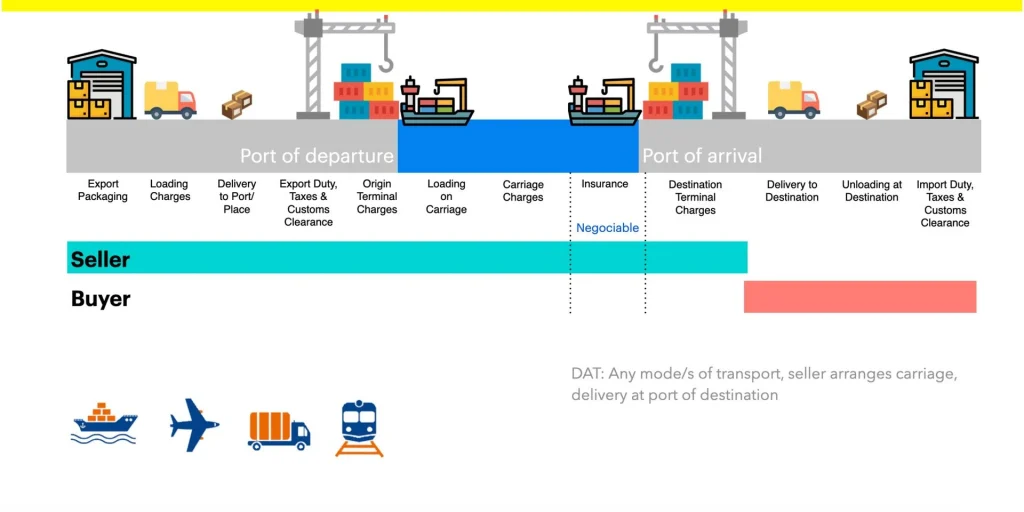DAT (Delivered at Terminal)
DAT (Delivered at Terminal) is one of the 11 Incoterms defined in the Incoterms 2020, published by the International Chamber of Commerce (ICC). It is an Incoterm that is commonly used in international trade when the buyer and seller are located in different countries and the seller is responsible for arranging and paying for the transportation of the goods to a named terminal at the destination.

Responsibilities and Obligations of Buyer and Seller
- The seller's responsibilities under DAT include:
- Delivering the goods at a named terminal at the destination
- Obtaining any necessary export licenses or permits
- The buyer's responsibilities under DAT include:
- Arranging and paying for the transportation of the goods from the terminal to the final destination
- Obtaining any necessary import licenses or permits
- Paying any applicable duties or taxes
- Bearing the risk of loss or damage to the goods once they are delivered at the named terminal
Advantages of using DAT include:
- The seller is responsible for delivering the goods at a named terminal at the destination, which eliminates the need for the buyer to arrange for the goods to be transported to the final destination.
- The buyer can inspect the goods at the terminal before taking possession, allowing for any potential issues to be addressed before the goods are moved to the final destination.
Disadvantages of using DAT include:
- The buyer is responsible for arranging and paying for the transportation of the goods from the terminal to the final destination, which can be a costly and complex process.
- The buyer is also responsible for obtaining any necessary import licenses or permits and paying any applicable duties or taxes
- The buyer bears the risk of loss or damage to the goods once they are delivered at the named terminal
Examples of when to use DAT include:
- When the buyer is located near the named terminal and has the capability to arrange for the transportation of the goods from the terminal to the final destination
- When the buyer wants to inspect the goods at the terminal before taking possession
- When the goods are bulky or heavy and require special handling or equipment to load or unload
- When the goods are perishable or require special storage conditions and the terminal has the necessary facilities to meet those needs.
It’s important to note that DAT is a more advanced Incoterm than EXW, FCA, FAS, FOB, CPT, and CIP and it shifts some of the responsibilities and risks from the buyer to the seller. It’s important for both buyer and seller to carefully consider their capabilities and resources before choosing to use DAT in a trade agreement, and to consult with legal and logistics experts to ensure compliance with laws and regulations. Additionally, it’s important to agree and specify the exact place of delivery, the name of the terminal, and any other relevant details in the sales contract. Also, the buyer should be aware that DAT does not include loading and unloading of goods, so the buyer should consider that before using this Incoterm.
